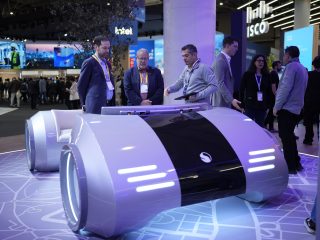In the latest episode of The Future of Work podcast, we are thrilled to host Alex Hirst and Lizzie Penny, co-founders of Hoxby, an innovative consultancy that has been pioneering the movement toward flexible work practices long before the pandemic forced businesses to rethink traditional working models. Their insight into how the very definition of work has evolved was thought-provoking and essential as we navigate the post-pandemic working world.
The global pandemic served as a catalyst, accelerating the change in how we perceive work, but this shift was already well underway. Hoxby, has been at the forefront of this evolution, pushing the boundaries of what work looks like and how it fits into people’s lives. As businesses emerge from the pandemic and employees demand more flexibility, the conversation around work is no longer centred on location or fixed hours. Instead, the discussion is about how work can be organized around the individual, focusing on productivity, well-being, and work-life balance.
In this episode, we explored critical topics with Alex and Lizzie that addressed the changing nature of work, the evolving role of employers, and how businesses can adapt to this new landscape.
What is Work Today?
Traditionally, work was synonymous with going to a specific location, usually an office, for a fixed period each day. This model worked for decades, but the very idea of what constitutes a “job” is rapidly evolving. Alex and Lizzie explain that today, work is no longer defined by where you go or how many hours you spend at a desk. Instead, work is defined by the value you create and the outcomes you deliver.
Hoxby’s philosophy centres around the idea of a “workstyle,” a term they coined to describe how individuals work best. This goes beyond the simple dichotomy of working from home versus working in an office. Instead, it encompasses when, where, and how individuals are most productive. The key, according to Alex and Lizzie, is flexibility—allowing employees to design their work around their personal lives, their peak productivity times, and their broader ambitions.
Is the Traditional Job Model Outdated?
One of the most provocative questions discussed in the episode was whether the traditional idea of a job—a role you commit to for fixed hours and in a specific location—is now an archaic concept. The pandemic has undeniably changed attitudes towards work, but Alex and Lizzie argue that this shift was already in motion. As employees began to see the benefits of flexible working arrangements, the demand for more freedom in how work is organized has only grown stronger.
The co-founders believe that the traditional 9-to-5, office-based job is no longer fit for purpose in many industries. They argue that a one-size-fits-all approach to employment is not only outdated but counterproductive, as it fails to recognize the individual needs and preferences of workers. With the rise of technology and digital communication tools, it’s possible for people to work from anywhere, at any time, making the rigid structures of the past increasingly irrelevant.
Are We All Freelancers Now?
This raises another important question: In this new work environment, are we all essentially freelancers, choosing when, where, and for whom we work? Alex and Lizzie acknowledge that while the freelance model offers a level of flexibility that many people now crave, not everyone wants the instability that often comes with freelancing.
Instead, they propose a middle ground, where employees can have the security of a permanent role while also enjoying the freedom to shape their own workstyle. This hybrid approach allows individuals to maintain a sense of autonomy and control over their work without sacrificing the benefits that come with traditional employment, such as job security, benefits, and career progression.
Hoxby: A Model for the Future of Work
TechComms was founded in 2006 as a dispersed, flexible agency long before remote work became a common business model, much like Hoxby. The idea behind TechComms was to enable top communications professionals to collaborate seamlessly without the constraints of a traditional office environment. Interestingly, Hoxby was also founded pre-pandemic, but the relevance of its business model has only grown in recent years. Their approach—one that allows workers complete flexibility over their schedules—has become a blueprint for businesses looking to adapt to a post-pandemic world. TechComms and Hoxby share a similar ethos, prioritizing work-life balance and empowering individuals to perform at their best, wherever they are. In this episode, Alex and Lizzie discuss how Hoxby has helped organizations navigate the complexities of transitioning to flexible working arrangements, something TechComms has championed from the outset. Together, these agencies demonstrate how distributed teams can drive innovation, adaptability, and success even in the most unpredictable times.
They emphasize that Hoxby’s model isn’t just about working from home; it’s about creating a work environment that allows people to perform at their best, wherever that may be. This could mean working from home, in an office, or even at night if that’s when someone is most productive.
Building Work Around the Individual
Perhaps one of the most significant takeaways from the episode is the idea that businesses need to build work around the individual, not the other way around. Alex and Lizzie argue that for businesses to thrive in the future, they must prioritize the ambitions and well-being of their employees. This means offering flexibility not just in where people work, but also in how their work is structured to support their personal and professional goals.
To get started, businesses need to have honest conversations with their employees about what they want and need from their work environment. By embracing this “workstyle” approach, companies can foster a more engaged, motivated, and productive workforce.
Embracing the Workstyle Revolution
As Alex and Lizzie explain, the future of work is here, and it’s flexible, dynamic, and built around the individual. Their work with Hoxby demonstrates that this approach is not only possible but highly effective. For businesses willing to embrace this new reality, the benefits are clear: happier employees, increased productivity, and a more resilient, future-proof organization.
The key takeaway from this episode is that flexibility is no longer just a perk; it’s a fundamental component of how work should be structured in the 21st century. Whether through hybrid models, fully remote options, or a mix of both, businesses that put their people first will be the ones leading the charge into the future of work.



